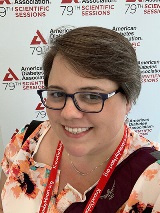ADA2019 Session Highlights: Gestational Diabetes, Fighting Stigma and the Integration of Diabetes and Cardiovascular Care
Jun 20, 2019, 12:00 PM
Last week I had the opportunity to attend the American Diabetes Association’s 79th Scientific Sessions in San Francisco. I’ve been a diabetes educator for 11 years and this was my first time at ADA. It was amazing! The beautiful thing about the ADA Scientific Sessions is the immense amount of research that is presented, or at least this year there was. And the results that were reported were game-changing. If you want to take a look at some of the live tweeting from the sessions, check out #ADA2019, #WINADA, @BeyondType2, @diaTribeNews and of course @ADA_DiabetesPro. There are many more active Twitter users, but #ADA2019 will connect you with most.
A big theme of the sessions dealt with the cardiometabolic interaction of the body. Specifically remembering that heart failure is a complication of diabetes and how to understand and recognize the problem, as well as treatment plans. The other big theme was hypoglycemia and the related changes that occur in the body. And lastly, language matters! How we speak to people with diabetes, in research studies, at conferences and about diabetes matters!
It has taken me a week to wrap my head around everything I learned, and continue to learn, from ADA2019. I have a ton of studies to look up and kind of feel like I need to add a subscription to Circulation in addition to The Diabetes Educator, Diabetes Care, and Diabetes Spectrum. There was so much information, that I’ve decided to highlight some of the most important sessions to me in this blog post.
Using Tools and Strategies to Effectively Communicate Science. This session, part of the Women’s Interprofessional Network (WIN) of the ADA Mini-Symposium, was presented by Dr. Joyce Lee and Dr. Krishana Sankar who showed some great new ways to use Twitter, LinkedIn, and other platforms to promote the work being done in science. Dr. Lee is someone I’ve followed on Twitter for years, so I was excited to hear her speak. Both Dr. Lee and Dr. Sankar talked about promoting your research on Twitter. When we conduct research, one of the biggest things we need to do as researchers is to get the word out. What better way to do that than by posting about it through social networks/media? One other piece is to tag the information with #scicomm which is a hashtag for “science communication”.
As diabetes educators, we really need to be aware of the physical changes and manifestations of heart failure and how this comorbidity/complication of diabetes is treated with both lifestyle adjustments and medications
The Heart and Type 2 Diabetes. Dr. Lopaschuk presented on Myocardial Metabolism in type 2 diabetes. Within type 2 diabetes, there is an increase in fatty oxidation to energy production. However, this source of fuel to the heart is detrimental, inefficient and increases the oxygen cost of contractility. One way to reduce this fatty oxidation is through the use of insulin glargine. The other is to increase ketone production as a source of fuel for the heart through the use of SGLT-2 inhibitors. However, there is still no clear answer as to why SGLT-2 inhibitors decrease heart failure severity. Dr. Chen also presented on The Failing Heart - Metabolic Considerations. The emphasis from Dr. Chen’s presentation was remembering that heart failure is a complication of type 2 diabetes and vice versa. There are several studies to take a look at; CHARM, EMPHASIS HF, and PARADIGM-HF upon returning home. Big thing to remember is that when people have diabetes and heart failure, that clinical outcomes are worse. The other piece to remember there are some people who are more prone to heart failure and diabetes, secondary to a deficiency in natriuretic peptide, including men, those with obesity, African Americans, and those with insulin resistance. Lastly, Dr. Jessup, the Chief Science and Medical Officer for the American Hospital Association, gave a great presentation on understanding the physical changes that occur secondary to heart failure. I really want this presentation to be given at AADE19, as a webinar, or a CE with case studies! But bottom line, as diabetes educators, we really need to be aware of the physical changes and manifestations of heart failure and how this comorbidity/complication of diabetes is treated with both lifestyle adjustments and medications. This is especially true as, in general, heart failure is treated less often in women and minorities. For more information, check out these AADE resources.
ADA Nutrition Therapy for Adults with Diabetes, the 2019 Consensus Paper. This was a popular session and Hope Warshaw has already brought us this info. Make sure to check out her AADE Blog post and read the consensus paper can here. Remember there are maladaptive hormones in obesity and that it’s not the individual’s fault but the pathophysiology; we all need more FIBER; and to screen for disordered eating with the people you see.
Ms. Youssef remind us that there is currently one CDE for every 1600 people with diabetes and to be able to fill this gap of access we need to create new ways to get people with diabetes to us and our services, as well as mentor in new educators, community health workers and other healthcare partners to provide services
As a diabetes educator, the two sessions that really spoke to me were the
ADA President of Health Care & Education Address: It’s All About Access by Gretchen Youssef, MS, RDN, CDE on access to diabetes education and the presentation by Virginia Valentine, APRRN, BC-ADM, CDE, FAADE who was this year’s Outstanding Educator in Diabetes called
The Most Important Thing WE Give to People is Hope - Overcoming Stigma in Diabetes and Obesity. Ms. Youssef remind us that there is currently one CDE for every 1600 people with diabetes and to be able to fill this gap of access we need to create new ways to get people with diabetes to us and our services, as well as mentor in new educators, community health workers and other healthcare partners to provide services. We need to be able to meet the people where they are which helps to usher in new types of service delivery models such as telehealth and virtual medical visits. The other area of access we all are aware of and working to help is the cost of insulin. 7.4 million Americans with diabetes use insulin, and 24% of adults using insulin are living below the poverty level. There are programs to help, and it is our responsibility as educators to be familiar with these programs and help people with diabetes use them as much as able. Ms. Valentine’s address discussed her almost 40-year career in diabetes education and how the attitudes and bias we have as educators and healthcare providers can help or harm those we serve. As educators, we know that the language we use matters, but we also need to understand our own biases when interacting with those with diabetes. We need to resist the urge to blame and shame, but instead, understand the world the person is coming from and remember and acknowledge that living with diabetes is hard work. And to take this message outside of working directly with people with diabetes, but also to challenge and defy common stereotypes of diabetes in the media, social media, our workplaces and our communities. In listening to Ms. Valentine’s message, there is work to be done, but there is progress. Want to learn more? Make sure to attend the session presented by the Diabetes Educator of the Year, Jane Dickinson at
AADE19 in Houston to learn about the next steps and what we can do, and what not to do.
The big announcement from Sunday was the results of the iDCL closed looped system. The results were so good! 168 people partook in the trial with 100% retention during the 6-month study. Time in range increased by 2.5 hours/day, with a reduction in A1c without an increase in hypoglycemia, and 10% reduction in hyperglycemia. The success of this technology is currently being studied in children in the Freelife Kid Study. Interim results look promising and we will all be on the lookout for the final results in the next few months.
One major area of diabetes care for me is on conducting research. I so want to have this be more a part of my life as well as putting that research into practice. I was very glad to see the CDC, the NDEP, and the NIDDK discussing How to Close the Evidence Gap. The Geriatric Society, the Obesity Society, and Family Medicine were also present, but I, unfortunately, did not catch their part of the presentation. An interesting detail in the work that NIDDK does is supporting research of people at risk for diabetes, all the way through research about complications associated with diabetes. Studies to look for include: AMP-T2D, RISE, ARMMS-T2D, and Look AHEAD to name a few. NDEP is also involved in a new initiative to better understand the natural history of gestational diabetes to help lay the groundwork for future interventions. The current study “Understanding the Glycemic Profile of Pregnancy” uses CGM as the main intervention throughout the pregnancy in order to see glucose changes as soon as they occur, not just when we test for them.
In diabetes care, it isn’t all about quantitative research. The last session I attended was on Qualitative Research, my passion. The key points from the presentation were that qualitative research allows for the answers to difficult conversations; allows participant’s to share their own views and accounts in their words, which can uncover issues or concerns about healthcare conversations that had not been anticipated or considered; identifies, examines, and explains factors that support or interfere with treatment plans and goals; and can generate hypotheses for further research. Qualitative research helps to define the individual, their needs and desires, and provides the evidence behind the person-centered care we all practice in diabetes education.
The 2019 ADA Scientific Session filled my brain full of knowledge and curiosity and my heart full of passion for the work I do every day. I have a lot to continue to learn about and I am excited about the results that are coming. Though the content available at the ADA Scientific Sessions can vary from the content at AADE Annual Conference, listening to these research presentations about the integration of diabetes care, cardiovascular care and renal care reassures me that AADE19 is going to continue to fuel the fires of knowledge and lead diabetes educators to our highest potential.

About the Author:
Chris Memering, BSN, RN, CDE, FAADE, has been a nurse since 2002 and a diabetes educator since 2007. She became a Certified Diabetes Educator in June of 2010. She has a Bachelor of Science degree in Chemistry and Nursing from the University of Virginia. Chris is a member of Sigma Theta Tau, the nursing honor society. She was a 2012 Clinical Excellence Award Winner from CarolinaEast, which is a peer recognition award for excellence in many areas of nursing and clinical expertise. Chris has served as the Chair of the North Carolina Coordinating Body for the American Association of Diabetes Educators, Inpatient Community of Interest Lead, and serves on the North Carolina Diabetes Advisory Council, as well as the advisory board to a local community pharmacy AADE DSMES Program. Currently, Chris serves on the Board of Directors for AADE and became a Fellow of AADE in 2018.